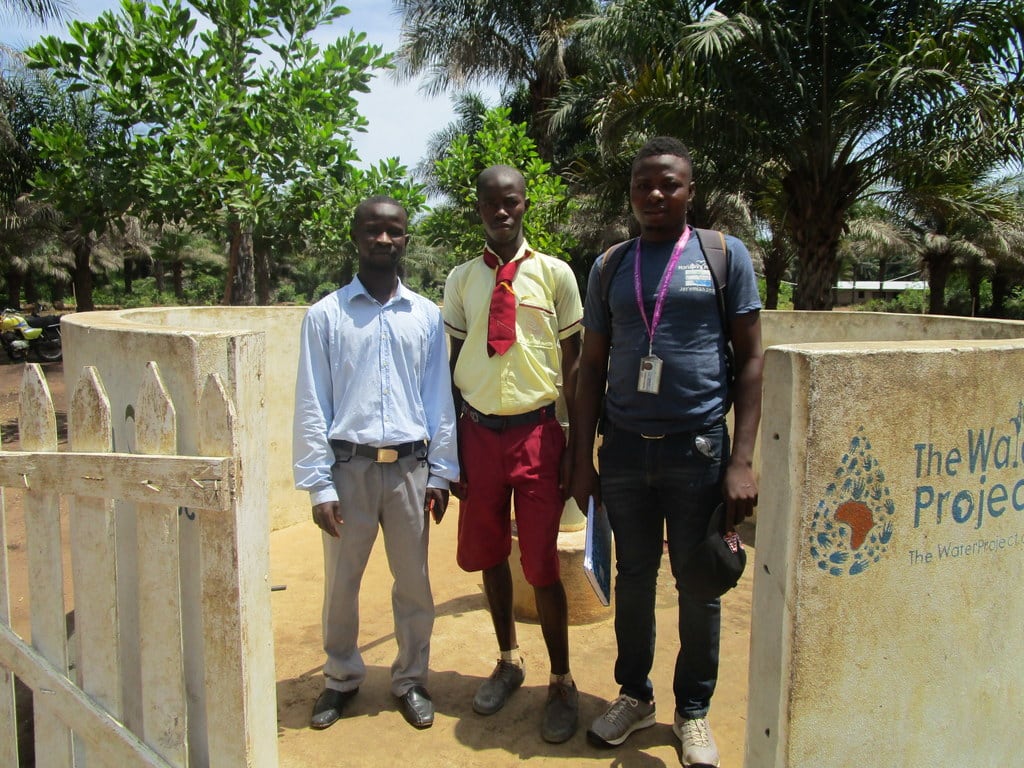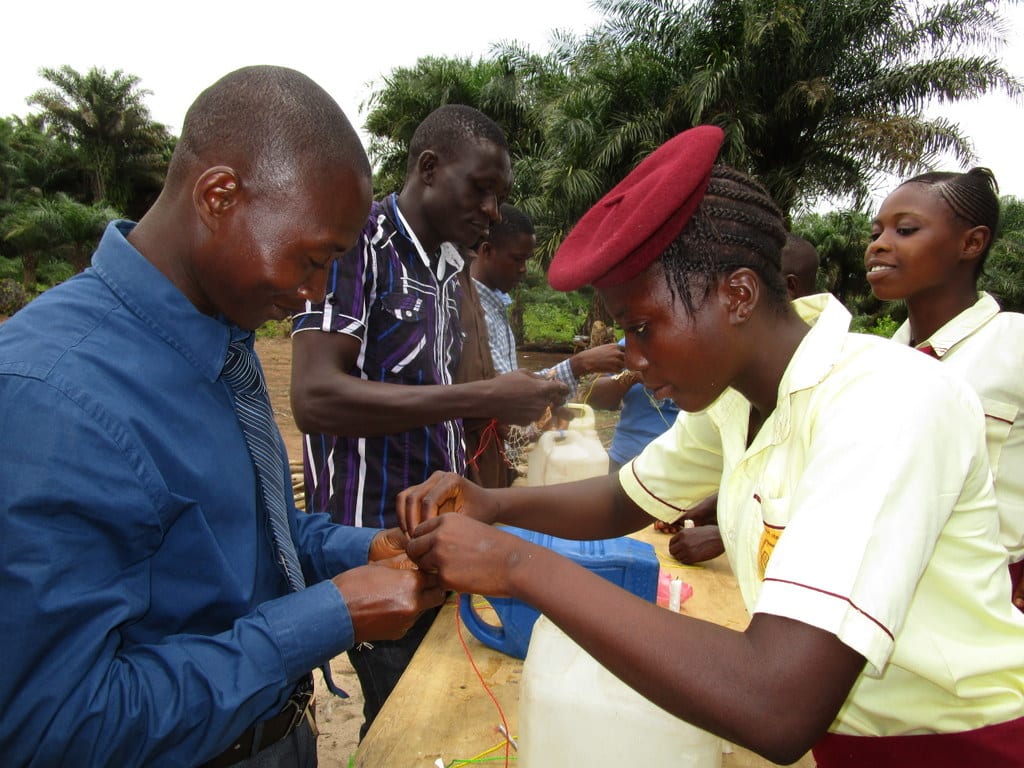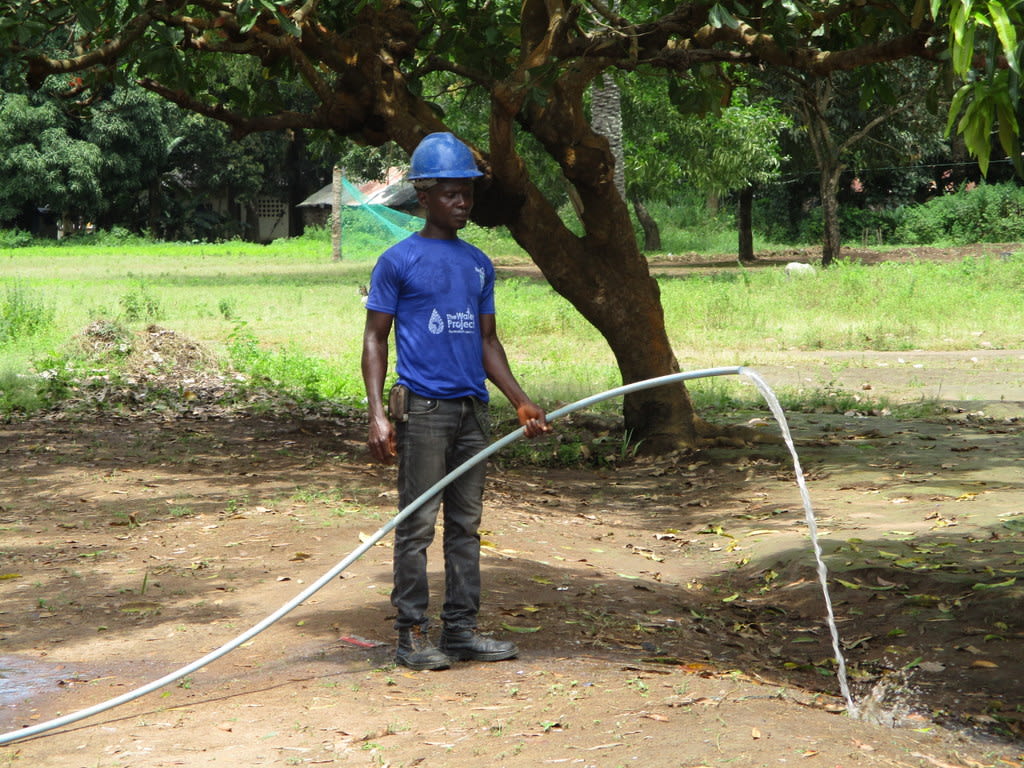This project is a part of our shared program with Mariatu’s Hope of Sierra Leone. Our team is pleased to directly share the below report (edited for clarity, as needed).
Welcome to the School
Ernest Bai Koroma Secondary School was established in August of 2013 at the old RC Primary School building in Mayaya Village. They were holding classes in this older building until they were able to build their own. It took four years and a lot of struggling to do this. While we were working in the Mayaya Section last year, we were approached by the heads of this school who wanted us to drill a well at their new location. We told them that it would not be possible to drill a well at a school which was still under construction. In Sierra Leone, it is not uncommon to see unfinished buildings with brush growing up inside of them because the person ran out of money to finish the job. We met with the school leadership and had a conversation about the need for the building to be completed, including latrines, and that the students must be attending classes. We continued to monitor their progress and decided that the well needed to be pushed to 2018.
You can just imagine how thrilled we were to receive word in the way of photographs and text messages that students are now attending the school! We could not be more excited to take part in the development of this school and the continued development of this community.
This school was started with 91 pupils and 8 staff who were all paid by the founders. It became a community school because these members are in Mayaya community. In 2014, this school was officially approved by the Ministry of Education, Science, and Technology, making it the first government-approved school in the section. Ernest Bai Koroma Secondary School presently employs eight staff and teaches 99 pupils. They have a school garden and other land reserved for development. It also shares a football playing ground with the primary school which is nearby the school. The school does not have a feeding program, but food vendors always come to sell their foods to both teachers and students.
This is a farming and fishing community, so students also learn these activities from their parents. Those who are not lucky enough to attend school must go straight to work farming and fishing or doing petty trading.
The school's location is very special because it is not close to houses, markets, or any other busy areas. Even though it is located in a fishing community, it is far away from the wharf.
Water Situation
Students gather swamp water with large buckets that they carry on their heads. The swamp's water is cloudy, but the school uses it for drinking, cooking, and cleaning anyways.
The water is particularly dangerous because of the dirt and waste washed into it during rains. Wild animals also share this same source with the school. After drinking this water, people break out in rashes, typhoid, diarrhea, ringworm, and cholera. It's also common to get malaria since the swamp is a breeding ground for mosquitos.
Sanitation Situation
The school started by building two new pit latrines, one for each gender. They're made out of mud blocks, zinc roofs and doors. The slab for the floor is cement with a hole in the middle. There are no hand-washing stations.
The community gets hit hard when there are outbreaks of disease. This school worked very hard to construct a pit latrine which was one of the requirements for us to come and drill a borehole. We believe that the school personnel and school head do care about hygiene and they really want us to impart good hygiene knowledge to the students and hope that the students will take this information home to their parents.
Principal Komrabai Saidu Conteh said, "It is painful for me that Mayaya is always victim of all diseases that break out in the nation due to poor hygiene such as cholera, diarrhea, and ebola which kills plenty of people in this section. The above-mentioned diseases leads to high death rate in the community, especially the outbreak of cholera in the year 2000 killed about 15 people in this community. In fact, one home was completely destroyed as a result of this disease called cholera. In 2014, 53 people were killed by ebola and 16 people survived. So this community as far as health is concerned, they are completely ignorant and my own very pupils are sometimes involved in this incidence."
Plans: Hygiene and Sanitation Training
Teachers and students will be trained at the school for three days, three hours a day. If it seems that students are getting too tired, we will space out the three hours more so that they can have breaks. We normally train community members as well, but the residential area is too far away.
Our facilitator plans to use the PHAST (Participatory Hygiene and Sanitation Training) method, group discussions, handouts, and demonstrations to teach about management and maintenance of the new pump, diseases transmission, hand-washing, building latrines and using them, and constructing dish racks. An entire session will lead participants through how to build a “tippy-tap,” which is a hand-washing station made from a jerrycan, rope, and sticks.
Plans: New Borehole Well
The well will be located on school ground, which is of course most convenient for the school.
Our team will drive over the LS200 mud rotary drill rig and set up camp for a couple of nights. Once the well is drilled to a sufficient water column, it will be cased, developed, and then tested. If these tests are positive, our mechanics will install a new India Mark II pump.
These students have suffered greatly from drinking swamp water. By drilling this borehole, they will be provided with plenty of safe drinking water.

 Borehole Well and Hand Pump
Borehole Well and Hand Pump
 Rehabilitation Project
Rehabilitation Project

































